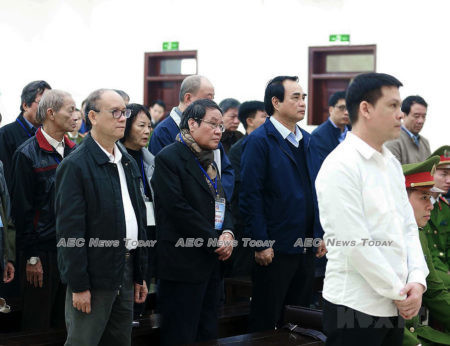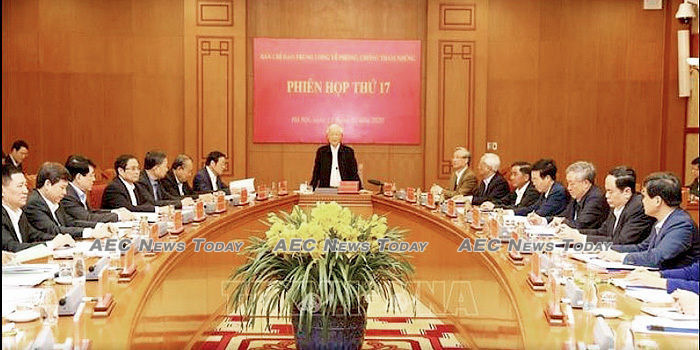A high-profile feature of current Vietnamese politics is the anti-corruption drive led by Nguyen Phu Trong, the general secretary of the Communist Party of Vietnam (CPV). As the anti-graft campaign enters its fifth year, Trong has announced that 10 more grand corruption cases will be put to trial in 2020.

But should Trong step down at the 13th CPV National Congress in early 2021, it is uncertain whether the anti-corruption campaign will maintain its momentum.
The anti-graft campaign has strongly influenced Vietnamese politics over the last four years. Official statistics show that two Politburo members and 21 current and former CPV Central Committee members have been disciplined as a result. Many of the officials were prosecuted and given long prison sentences, including former Politburo member Dinh La Thang, and two former ministers of information and communications, Nguyen Bac Son and Truong Minh Tuan.
There is no “no-go zone” in this anti-graft campaign. For the first time in its history the CPV has extended its anti-corruption drive into the police and armed forces. Thirty-eight senior officers, including 23 generals, have been disciplined or prosecuted over the past four years. These forces were largely exempt from anti-corruption efforts in the past because of their immense political power and their important role in regime security.
The unprecedented campaign has improved public confidence in the CPV leadership and cemented Trong’s political position. Unlike the previous term of office, when his authority was challenged by a former prime minister, Nguyen Tan Dung, Trong’s grip on the political system has strengthened. This enables him to single-handedly shape the party’s agenda, including making personnel arrangements for the upcoming Party Congress.

Impact unclear
Many of Trong’s political rivals have fallen victim to the campaign, including former cronies and associates of Dung.
Meanwhile, several of his loyal and trusted followers have been promoted to key positions to facilitate his mandates. The most notable is Tran Cam Tu, who was appointed head of the CPV’s Central Inspection Commission in May 2018 and has since acted as Trong’s right-hand man in his “crusade” against corruption.
Although the anti-graft campaign is welcomed by the public, its impact on the general state of corruption in Vietnam remains unclear.
The campaign mainly targets high-level corruption, while corruption at lower levels of government, or in agencies that people and businesses frequently deal with, such as the tax and customs authorities, have not shown clear signs of improvement.
Only 13 per cent of people surveyed in Ho Chi Minh City and 35 per cent of those surveyed in Hanoi believed that corruption has decreased over the past year.
The campaign has also made some officials unwilling to make major decisions or promote economic growth initiatives for fear of legal consequences. This has negatively impacted certain economic sectors, like the real estate industry of Ho Chi Minh City.
Anti-corruption investigations and officials’ personal reservations have delayed the licensing process for property projects, leading to falling supply of new properties, surging property prices and declining government revenue from land fees. In light of this situation Trong called for a stop to “self-preservation” and the resulting inaction of officials in decision-making positions.

With the 13th CPV National Congress scheduled for early next year, questions remain as to how the anti-corruption campaign will be maintained following any leadership changes. Trong will likely step down at the Congress due to his advanced age and fragile health. Given the level of control Trong has over the Party, his successor will likely be handpicked by him.
Trong will look for someone to carry on his legacy and continue the fight against corruption — a cause that he believes is crucial to the party’s survival. Tran Quoc Vuong, the standing secretary of the CPV Central Committee’s Secretariat, so far appears to be his favourite candidate.
Still, whoever succeeds Trong will face significant challenges in continuing his anti-corruption mission at the same level witnessed over the past four years.
Less dependent
First, the new party chief will not have the same level of power and authority enjoyed by Trong. The newcomer will have to establish their own authority and power base within the first few years of their leadership. This might involve making compromises with corrupt officials or infighting with political rivals, distracting them from anti-corruption efforts.
Second, as most grand corruption cases have been prosecuted over the past four years, the remaining few cases for the new leader to showcase their anti-corruption agenda, while uncovering new ones, will take time.
Third, with the anti-graft drive slowing economic activity in certain sectors, the new leadership might need to strike a balance between fighting corruption and promoting economic growth.
While the new leadership will undoubtedly maintain the fight against corruption, it may be less broad and intense than it was under the watch of Trong. But this does not mean that the anti-corruption drive will become less consequential for Vietnam’s political economy.
Vietnamese officials should begin to shift the focus of the campaign by making more efforts to fight lower level corruption rather than focussing on big cases. Overhauling various political and legal institutions to prevent corruption, rather than dealing with its consequences, will also make Vietnam’s fight against corruption more sustainable, effective and less dependent on any single politician.
This article was written by Le Hong Hiep, a Fellow of the Vietnam Studies Programme at the ISEAS–Yusof Ishak Institute, Singapore. It was first pusblished on East Asia Forum under a Creative Commons License and is reproduced here with its permission.
Feature Photo VNA
Related:
- Vietnamese citizens see corruption fight making real headway (VN Express)
- Central Steering Committee on anti-corruption convenes 17th session (Viet Nam News)
- Battle lines drawn for Vietnam’s future leadership (Asia Times)
East Asia Forum
It consists of an online publication and a quarterly magazine, East Asia Forum Quarterly, which aim to provide clear and original analysis from the leading minds in the region and beyond.
Latest posts by East Asia Forum (see all)
- China’s South China Sea bullying seeing increased blowback from Asean claimants – February 2, 2022
- Illusionary, delusionary or visionary? Cambodia tests living with COVID-19 – December 6, 2021
- Prioritising a Philippine–EU FTA is vital for post-pandemic recovery – July 26, 2020
- Time for Asean to stand up for itself in the South China Sea – July 25, 2020


